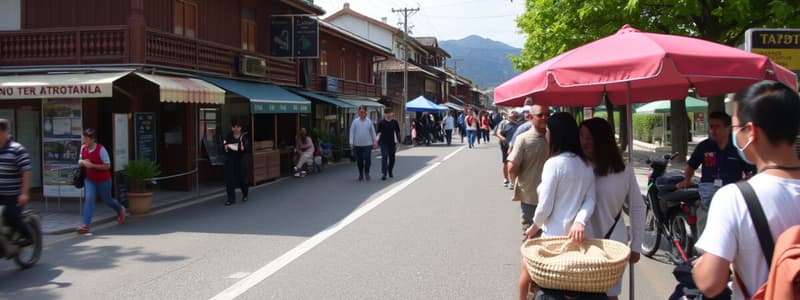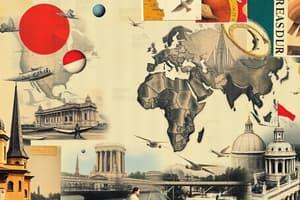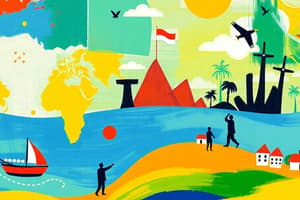Podcast
Questions and Answers
What distinguishes tourism from migration?
What distinguishes tourism from migration?
- Tourism involves non-resident travel. (correct)
- Tourism is characterized by permanent residence.
- Tourism is a long-term movement.
- Tourism involves earning activity.
What is defined as a tourist?
What is defined as a tourist?
- A local resident visiting a nearby city.
- A traveler who does not stay overnight.
- A person staying at least 24 hours for leisure or business. (correct)
- A person traveling for 12 hours or less.
Which of the following is NOT a purpose of travel listed in the content?
Which of the following is NOT a purpose of travel listed in the content?
- Entertainment
- Shopping (correct)
- Leisure
- Business
What are the two types of visitors recognized by the United Nations Conference?
What are the two types of visitors recognized by the United Nations Conference?
What is an excursionist defined as?
What is an excursionist defined as?
Which characteristic of a tourist product is TRUE?
Which characteristic of a tourist product is TRUE?
What factor is NOT considered an element of travel?
What factor is NOT considered an element of travel?
What is a tourist destination?
What is a tourist destination?
Flashcards are hidden until you start studying
Study Notes
Definition of Tourism
- Defined as the phenomena and relationships arising from the travel and stay of non-residents, distinct from migration.
- Temporary movement of individuals away from their usual residence, unrelated to earning activities.
Classification of Visitors
- Tourists: Individuals staying for at least 24 hours for purposes such as leisure, business, family visits, missions, or meetings.
- Excursionists: Individuals visiting a destination for less than 24 hours without an overnight stay.
Elements of Travel
- Distance traveled.
- Length of stay at the destination.
- Traveler's place of residence.
- Purpose of the journey.
Purposes of Travel
- Visiting friends and relatives.
- Attending conventions, meetings, and seminars.
- Business-related travel.
- Recreation and entertainment.
- Personal matters.
Nature of a Tour
- Tours can be categorized into independent tours or package tours, highlighting different modes of travel organization.
Characteristics of Tourist Products
- Tourist services are psychological in their appeal, influencing attraction to destinations.
- The quality of these services tends to fluctuate over time, affecting overall visitor experience.
Tourist Destination
- A tourist destination is any geographical unit where tourists visit and stay, including villages, towns, cities, regions, islands, countries, and continents.
Studying That Suits You
Use AI to generate personalized quizzes and flashcards to suit your learning preferences.




